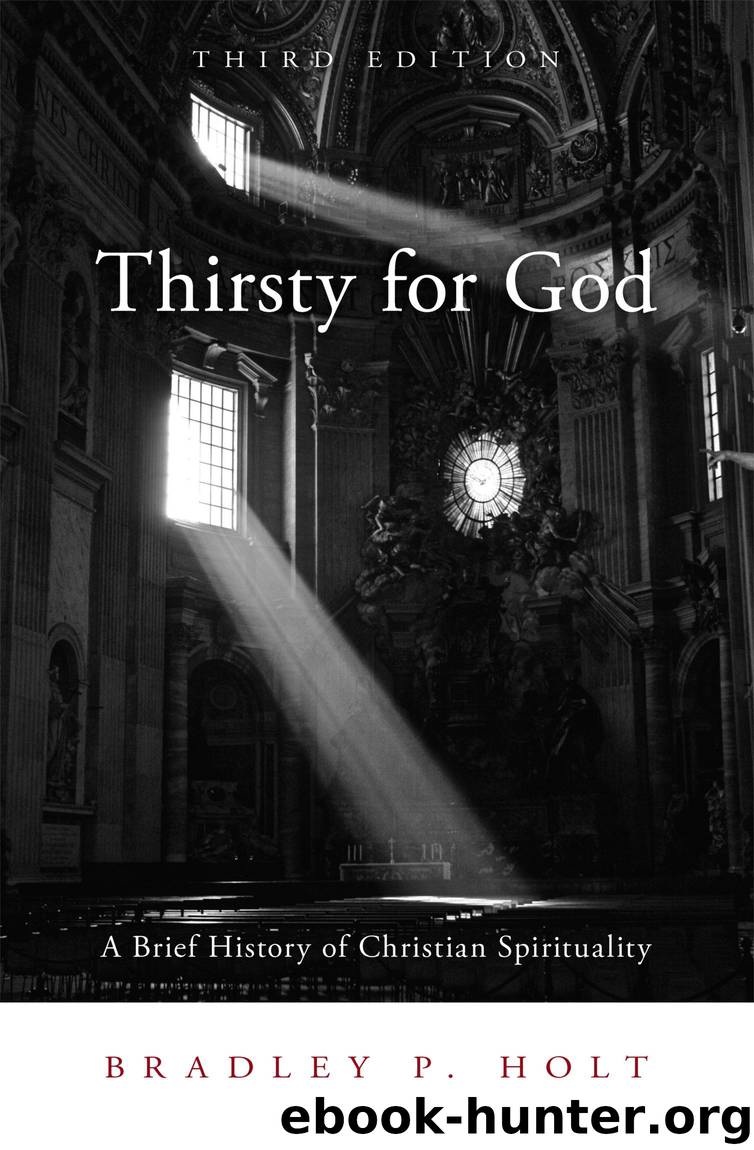Thirsty for God by Bradley P. Holt

Author:Bradley P. Holt [Bradley P. Holt]
Language: eng
Format: epub
ISBN: 9781506432540
Publisher: Fortress Press
Evangelicals and Methodists
The Pietists influenced the Evangelicals, who emerged in the following century in England and New England. The 1700s were an age in which both Rationalism (witness the U.S. Constitution) and evangelicalism (witness the rise of the Methodists) developed. Evangelicalism seems an obvious foil to Rationalism, and yet it shared many of Rationalism’s assumptions. It had an inquiring practical bent; and John Wesley was willing, one might say, to do scientific research in the realm of the spiritual by waiting to see which religious experiences were valid and which led nowhere.
We can describe early evangelicals in three settings: the Anglican Church, the Methodist movement, and the Congregationalist Churches of New England. What all had in common was preaching for repentance, expecting a changed life after conversion, and finding room for expressions of emotion not always tolerated in the previous denominations.[10]
No single person led the Anglican branch of this movement. Perhaps one of the best known in North America is John Newton (1725–1807) because he was the author of the beloved hymn “Amazing Grace” (“how sweet the sound / that saved a wretch like me”). Newton had been a captain in the slave trade, was dramatically converted, and became an Anglican priest. He loved to preach and actually died in the pulpit. Like other Evangelicals, he believed in early rising for prayer, Bible reading as an indispensable part of devotion, and the gathering of the family for group prayers.
In its second generation, Anglican evangelicalism produced one of the outstanding social reformers of the modern era, William Wilberforce (1759–1833), whose persistent voice in the British Parliament led to the abolition of the transatlantic slave trade in the early 1800s. His prayer life is said to have given him the perseverance over the decades necessary for the passage of this legislation. A leading member of the Clapham Sect, a fellowship of wealthy Evangelicals, he wrote A Practical View of the Prevailing System of Professed Christians in the Higher and Middle Classes in This Country Contrasted with Real Christianity. He also advocated for the humane treatment of animals.
Which are the great moral issues of our day? How might you influence the state or national government toward a more just society?
In the third generation came Henry Venn (1796–1873), General Secretary of the Church Mission Society, who advocated “self-governing, self-supporting, and self-propagating churches” instead of continued dependency on foreign missionaries in Africa and Asia.[11] Venn’s concept is fundamental to the practice of indigenous Christian spirituality. Ahead of his time, Venn advanced Nigerian Samuel Ajayi Crowther to be the first African bishop in the Anglican Church. When Crowther died (long after Venn), his successor was a European bishop, a step backward that was much resented by Nigerians. The reversal of Venn’s policy of indigenous leadership led to the founding of some of the first African indigenous churches, whose spirituality was to be much more African (see chapter 9).
Is there a place for international evangelism in your spirituality? Why or why not?
The Methodist story of the 1700s is full of drama and opposition.
Download
This site does not store any files on its server. We only index and link to content provided by other sites. Please contact the content providers to delete copyright contents if any and email us, we'll remove relevant links or contents immediately.
The 5 Love Languages: The Secret to Love That Lasts by Gary Chapman(9768)
The Space Between by Michelle L. Teichman(6921)
Assassin’s Fate by Robin Hobb(6193)
Wiseguy by Nicholas Pileggi(5762)
Everything Happens for a Reason by Kate Bowler(4729)
Gerald's Game by Stephen King(4633)
Pillow Thoughts by Courtney Peppernell(4268)
A Simplified Life by Emily Ley(4155)
The Power of Positive Thinking by Norman Vincent Peale(4053)
Harry Potter and the Prisoner of Azkaban (Book 3) by J. K. Rowling(3346)
Resisting Happiness by Matthew Kelly(3332)
Girl, Wash Your Face by Rachel Hollis(3273)
Being Aware of Being Aware by Rupert Spira(3269)
The Code Book by Simon Singh(3168)
The Secret Power of Speaking God's Word by Joyce Meyer(3154)
More Language of Letting Go: 366 New Daily Meditations by Melody Beattie(3017)
Real Sex by Lauren F. Winner(3002)
Name Book, The: Over 10,000 Names--Their Meanings, Origins, and Spiritual Significance by Astoria Dorothy(2967)
The Holy Spirit by Billy Graham(2938)
